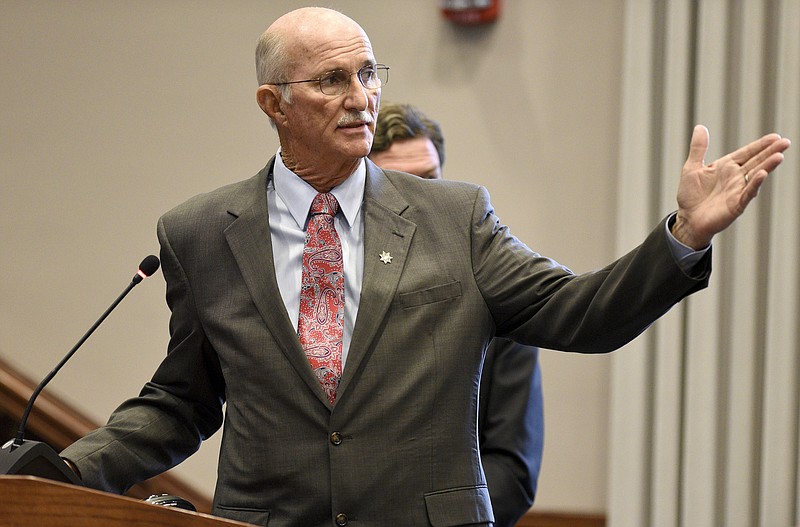A developing program to get people with addiction and mental health problems out of the Hamilton County Jail and into treatment could get a big boost if a federal grant comes through.
The sheriff's office has been working with health and wellness agencies for nearly two years on the FUSE (Frequent Users Systems Engagement) initiative, Sheriff Jim Hammond told Hamilton County commissioners at their Wednesday agenda session.
FUSE team
› Hamilton County Sheriff’s Office› BlueCross BlueShield of Tennessee› The city of Chattanooga› Parkridge Healthcare› Chattanooga Housing Authority› Moccasin Bend Mental Health Institute› Hamilton County Mental Health Court› Hamilton County Health DepartmentSource: Sheriff’s office
The "unique" grant "would allow us to move ahead with what we're trying to accomplish to get mental health folks out of the jail and into treatment programs," the sheriff said.
Estimates are that as many as 40 percent of people in the jail have untreated mental illness, addiction and other problems that keep them cycling in and out of the jail, courts and emergency rooms.
The FUSE program aims to provide those people with intensive, wraparound services such as counseling, treatment, medication monitoring and supervision where they live.
The grant from the Substance Abuse and Mental Health Services Administration would pay to set up what's called an assertive community treatment (ACT) team up and running. It would provide $678,000 a year for five years. No local match is required.
Once the ACT team is hired, TennCare will pay for the actual client services, said Janna Jahn, with the Hamilton County Development Office.
"The grant will allow us to get this project off the ground in a very robust way, give us five years to work out all the kinks, then we should be good to go," Jahn said.
The FUSE coalition already has raised around $800,000, she said.
"We had no idea this grant was going to come along, so we've been working to put the funds we need in place. This grant, gosh, would just allow us to add all the bells and whistles," Jahn said.
That could be anything from upgraded computer systems to wellness programs that complement clinical treatment with social and emotional or other support, she said.
G.A. Bennett, with the sheriff's office, said the sheriff's office is competing for one of only seven grants nationwide, but the FUSE team has a good chance because of how much work has already been done.
Added Hammond, "I think that's what will make us attractive, we've done a lot of the groundwork. There's been a big commitment to come together and make this project successful."
Also Wednesday, commissioners had another round of talk about their judicial commissioner program.
The four judicial commissioners, or magistrates, work in the jail at night and on weekends setting bonds and signing warrants when court isn't in session. The aim is speed up the bonding process and keep numbers down in the jail.
On the agenda
Other items scheduled for the May 16 Hamilton County Commission meeting include:› A report on deer at the Enterprise South Nature Park from the Tennessee Wildlife Resources Agency› The annual sheriff’s office report to the commission› A contract for $48,468 for Americans with Disabilities Act renovations at the Birchwood Health Clinic› Contracts for health and dental care for the uninsured through the health department.
Commissioners recently voted to raise magistrate pay incrementally from $63,000 a year to $90,000, to match the pay of other judges. Two of the four magistrate positions are coming open, and commissioners are planning to interview 11 applicants for the jobs May 23.
But Commissioner Joe Graham asked his colleagues to consider a new approach he said would save the county around $400,000 a year.
They raised the pay because of a state rule change saying magistrates could not maintain a separate law practice. But that doesn't mean the county needs to pay four magistrates as full-time judicial personnel, Graham said.
He suggested hiring a chief magistrate at the full-time rate and letting that person hire part-timers on an hourly basis, subject to commission approval. Those attorneys could keep up their practices and supplement their incomes, he said.
"We could have as many attorneys as we want; it gives us an opportunity to rotate attorneys through. There's a lot of struggling attorneys out there" who could earn extra money. Meanwhile, the county would save the cost of salary and benefits for three full-time magistrates, at about $128,000 apiece all told, Graham said.
"I feel like this is a golden opportunity for us as a commission, since this is the only program we operate, to show the other departments we are working hard to save money," Graham said.
Commissioner Tim Boyd, chairman of the Security and Corrections Committee, welcomed the idea and set up a committee meeting after the May 16 voting session to talk it over.
Contact staff writer Judy Walton at jwalton@timesfreepress.com or 423-757-6416.
